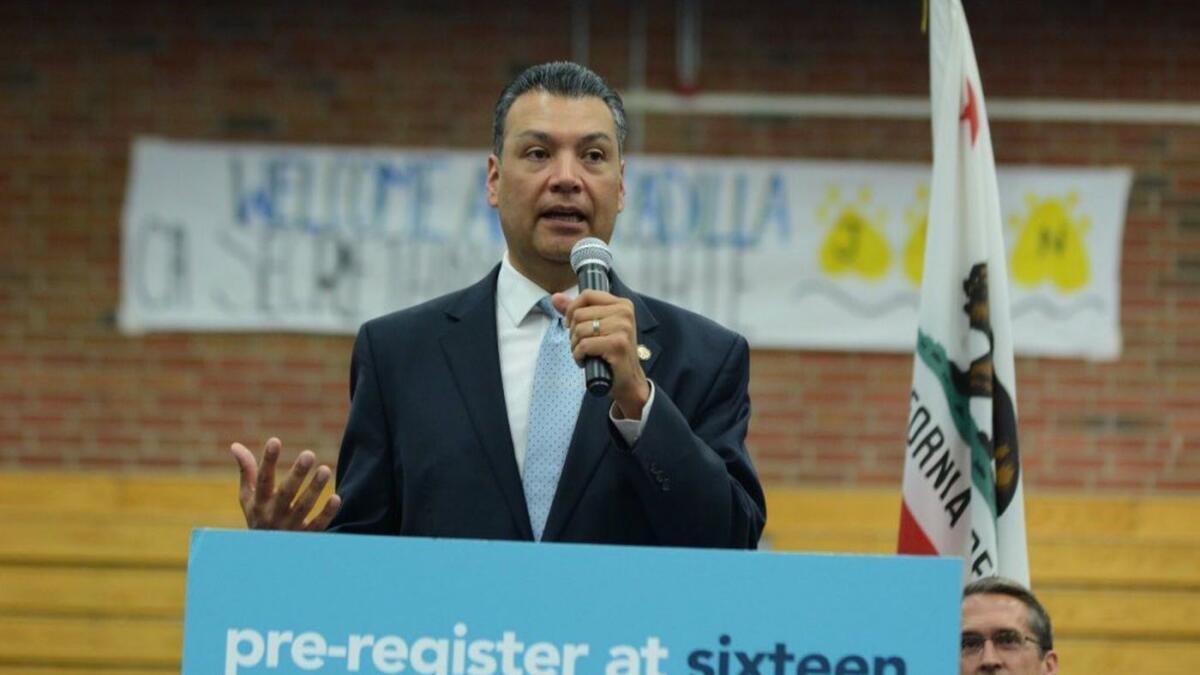Capitol Journal: California election officials are defending against cyberattacks — without any help from D.C.

- Share via
Reporting from Sacramento — California election officials are guarding their voting machines and registration lists against Russian hackers — although no one has spotted any.
“I operate under the assumption that hacking is actually happening and California is a target,” Secretary of State Alex Padilla says.
“This year, there’s a big focus on several congressional races that could determine the House majority. The stakes in California have national implications.”
But would the Russians actually try to change election outcomes?
“I have no doubt that if they could, they would,” says Padilla, a Democrat who’s heavily favored to win reelection in November.
Hacking into California’s voting system and altering votes, however, is considered by most experts to be practically impossible. That’s because voting machines aren’t hooked up to the internet. State law forbids it. A hacker might attack one machine but couldn’t reach into the entire vote-collecting system.
“We invited the Department of Homeland Security to try to hack into our system,” says Joe Holland, Santa Barbara County’s recorder-assessor and president of the state association of election officials. “They stayed five days and couldn’t do it.”
Voter registration lists are different, however.
“People are registered online. Records are connected to the internet. And hackers could break into those,” says Matt Bishop, a UC Davis computer science professor. “They could create chaos by disenfranchising voters.”
Why would Russians want to do that? To tick off Americans and undermine the credibility of U.S. elections — to further divide us and exacerbate political polarization. This was their goal in interfering with the 2016 presidential election — that and helping President Trump beat Hillary Clinton, who really irked Russian President Vladimir Putin.
Fomenting discord also is achieved by spreading false information — “fake news” — on social media, including Twitter and Facebook.
Like what?
“Everything from directing people to the wrong polling places — that happens,” Padilla says. “And there’s the age-old tactic of trying to tell voters that the election is on a different date. Two years ago, they were saying that provisional ballots aren’t counted. That’s absolutely not true.”
Yes, there were lies flowing through the internet that thousands of boxes of provisional ballots were stacked in warehouses, never to be opened. Some people actually believed it.
A provisional ballot is cast when someone shows up at a voting place and isn’t listed on the precinct registration list. The voter might have gone to the wrong location. Rather than send the person packing, a provisional ballot is handed out. And the voter is checked out later.
“Well over 90% of provisional ballots check out and are counted,” Padilla says.
Los Angeles County Voter Registrar Dean Logan says, “There’s also an ongoing myth that we don’t count mail ballots unless it’s a close contest. We always count all ballots.”
No election official I talked with knew of any Russian hacking in California, but they’re on alert with 24/7 monitoring, they say.
National security officials revealed last year that Russian hackers tried to break into 21 states’ election systems in 2016.
California apparently wasn’t one, despite an initial report by the Department of Homeland Security. The agency later corrected itself and said Russian hackers had actually “scanned” the state Department of Technology’s network, not the secretary of State’s.
“Our notification [from Homeland Security] was not only a year late,” Padilla complained at the time, “it also turned out to be bad information.”
“Late” was common for the Obama administration in defending against cyberattacks in 2016.
Coverage of California politics »
“While the Americans dithered, the Russians feasted,” New York Times national security correspondent David E. Sanger wrote in his new book, “The Perfect Weapon: War, Sabotage, and Fear in the Cyber Age.” He was referring to Russians cracking the Democratic National Committee’s computer system, and he was critical of both the DNC and the FBI.
Writing about the Russians’ social media campaign of misinformation and troublemaking, Sanger observed: “To this day, no one can prove whether it actually affected the election’s outcome — in fact, the dispute over its effects widened the political divide, as the Russians intended.”
In Sacramento, Gov. Jerry Brown and the Legislature recently appropriated $134 million to upgrade county voting systems and defend them against hackers.
Padilla criticized the Republican-controlled Congress for rejecting a $250-million appropriation that would have helped states protect their voting systems.
“Intelligence officials have been crystal clear: our democracy is, and will continue to be, under attack by Russia and others,” he said in a statement.
Padilla noted that Congress simultaneously approved a $717-billion defense spending bill.
“Bolstering our election infrastructure is a matter of national security,” he asserted.
Republicans claimed the money for cyberattack defense wasn’t needed.
“I know what we need for safe and secure elections, and that’s voter ID,” said Rep. Jim Jordan (R-Ohio), a leader of the conservative House Freedom Caucus.
Ah, yes, the old illegal voting myth — the cry that undocumented immigrants are stuffing the ballot box. Nonsense.
After Trump got fewer popular votes than Clinton, but won the presidency in the electoral college, he claimed that millions of people voted illegally. He created a commission to prove his fantasy, but had to shut it down when no evidence was found.
“Voter fraud gets talked about in partisan circles and in the heat of campaigns,” Logan says, “but it’s just not borne out to be factual.”
What’s factual are Russian cyberattacks. California isn’t dithering.
Follow @LATimesSkelton on Twitter
More to Read
Get the L.A. Times Politics newsletter
Deeply reported insights into legislation, politics and policy from Sacramento, Washington and beyond. In your inbox twice per week.
You may occasionally receive promotional content from the Los Angeles Times.











